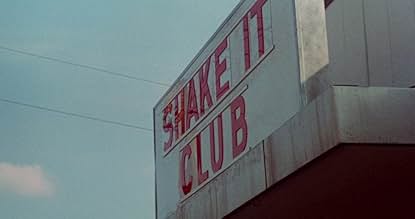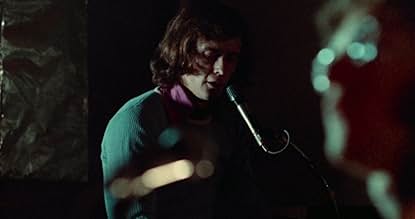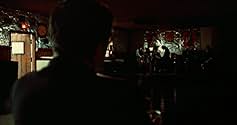Arthur et Gerrie Mason, des banlieusards de New York confortables, apprennent que leur fille adolescente apparemment innocente, Maxie, est toxicomane.Arthur et Gerrie Mason, des banlieusards de New York confortables, apprennent que leur fille adolescente apparemment innocente, Maxie, est toxicomane.Arthur et Gerrie Mason, des banlieusards de New York confortables, apprennent que leur fille adolescente apparemment innocente, Maxie, est toxicomane.
Anthony D. Call
- Dr. Lauren
- (as Anthony Call)
Janet Sarno
- Night Nurse
- (as Jan Sarno)
Avis à la une
Theatrical remake of a well-regarded 1968 "CBS Playhouse" special for television about the secret drug-life of today's suburban teenagers was directed both times by David Greene, who practically disowned this franker, R-rated version. The problem could be in the central casting: Eli Wallach pushes far too hard as the clueless father of a tripping 16-year-old girl while mom Julie Harris smokes and looks distraught (when her daughter tells her she's on the Pill, Harris hilariously responds, "I think I'm losing my mind!"). The original rock songs (performed by The Bead Game and The Glass Bottle) are dreadfully pedagogic--hoping to 'inform' us with their lyrics--but, since nobody can reach this alienated girl, what good is it probing her inner-thoughts to music? Generation Gap tale has a solid cast (including Hal Holbrook, Cloris Leachman, Rue McClanahan, Stephen McHattie, Don Scardino, newcomer Deborah Winters, and Rutanya Alda as a pixilated nurse), yet the pitch of the film is off, hysterical instead of riveting. ** from ****
Sadly Eli's overacting and completely preposterous reactions to every single thing that happened wore extremely thin pretty rapidly. It's too bad because there's many things that work in this film. The music is very good and there's some very powerful scenes of confrontation and honesty. Seems to lose it's direction from time to time but eventually finds it's way back on track. It's easy to say these are messed up people, and maybe they are. But it was common and new and there was no frame of reference for people to cope with these issues. The neighbor's weren't any better. Parents are rarely ever portrayed realistically in movie throughout the decades. In this film the fathers were more over the top in their knee jerk reactions. The mothers were sympathetic and I did feel for them. The young adults were all excellent and once again I should say that the music was appropriate and absorbing. I can see why it garnered the praise it did and it's not nearly as dated as others from this era. This could have been a solid 6 or even a 7 if it wasn't for Eli's dundering incompetence. He should stick to westerns where his stilted dialogue delivery is easier to overlook. Editing was okay and the mood was consistent for the most part.
David Greene's obscure THE PEOPLE NEXT DOOR is out to prove that a parent, in particular a father working eight-hours and then having a nightcap and sleeping pill to fall asleep, is just the same as a wayward teenager dropping acid...
The latter happens quickly as underrated starlet Deborah Winters, after watching brother Stephen McHattie's hippie band rehearsing, winds up in her own closet, seeing God and thus, freaking out...
She later attempts spitefully french-kissing dad Eli Wallach, married to chain-smoking Julie Christie, both desperately trying to figure out what makes their drug-fueled, discontented daughter tick...
Ironically, Winters would wind up in another LSD-centered cult film, BLUE SUNSHINE, and she always gives an intense performance, visually epitomizing the cute blonde California girl who's miserably unglued, in this case adding much-needed suspense, like anything can happen at any time...
And while both her bad acid trip and idealistic tantrums literally peak too soon for an effectively cohesive melodrama of a clashing suburban clan to follow, NEXT DOOR is a semi-worthwhile compromise between an anti-drug exploitation and counter-culture propaganda for the young people themselves...
That is, despite the youth-rebel cliches... that Winters successfully rises above despite a somewhat mundane television-style script... which fits since she had co-starred in a 1968 CBS Playhouse (with a different surrounding cast) that this feature was adapted from...
So when she eventually takes a backseat to the primary story (while mom and dad deal with their own mundane demons), there's hardly any tale to tell since, after all, a bad trip beats a bummer trip.
The latter happens quickly as underrated starlet Deborah Winters, after watching brother Stephen McHattie's hippie band rehearsing, winds up in her own closet, seeing God and thus, freaking out...
She later attempts spitefully french-kissing dad Eli Wallach, married to chain-smoking Julie Christie, both desperately trying to figure out what makes their drug-fueled, discontented daughter tick...
Ironically, Winters would wind up in another LSD-centered cult film, BLUE SUNSHINE, and she always gives an intense performance, visually epitomizing the cute blonde California girl who's miserably unglued, in this case adding much-needed suspense, like anything can happen at any time...
And while both her bad acid trip and idealistic tantrums literally peak too soon for an effectively cohesive melodrama of a clashing suburban clan to follow, NEXT DOOR is a semi-worthwhile compromise between an anti-drug exploitation and counter-culture propaganda for the young people themselves...
That is, despite the youth-rebel cliches... that Winters successfully rises above despite a somewhat mundane television-style script... which fits since she had co-starred in a 1968 CBS Playhouse (with a different surrounding cast) that this feature was adapted from...
So when she eventually takes a backseat to the primary story (while mom and dad deal with their own mundane demons), there's hardly any tale to tell since, after all, a bad trip beats a bummer trip.
(1970) The People Next Door
PSYCHOLOGICAL DRAMA
It has parents, Arthur Mason (Eli Wallach) and Gerrie Mason (Julie Harris) have two children with promising music careers- one as a pianist; their daughter, Maxie Mason (Deborah Winters) and their rock and roll son, Artie Mason (Stephen McHattie). Problems start as soon as their daughter, Maxie begins to try acid and she not only gets herself hooked but also craves to try other drugs such as LSD.
Upon looking at the rating of one of my favorite movie critics, Roger Ebert, I was quite surprised he gave this movie a positive rating to the tune of 3 and a half stars out of 4 when I thought when I watched it, it felt it was out of touch and outdated. Upon glancing Ebert's review, he kept mentioning the documentary "Woodstock", as if the two movies are somehow linked- they are not. Perhaps during the era but these days there are better movies made about the subject matter than their were back then. It is also more unlikely that a daughter pianist would get into drugs than someone who is into rock and roll who happens to be the family's son. It also does not address other drugs that can be helpful such as marijuana and mushrooms to which tests have been revealed they can be helpful, but are often abused.
It has parents, Arthur Mason (Eli Wallach) and Gerrie Mason (Julie Harris) have two children with promising music careers- one as a pianist; their daughter, Maxie Mason (Deborah Winters) and their rock and roll son, Artie Mason (Stephen McHattie). Problems start as soon as their daughter, Maxie begins to try acid and she not only gets herself hooked but also craves to try other drugs such as LSD.
Upon looking at the rating of one of my favorite movie critics, Roger Ebert, I was quite surprised he gave this movie a positive rating to the tune of 3 and a half stars out of 4 when I thought when I watched it, it felt it was out of touch and outdated. Upon glancing Ebert's review, he kept mentioning the documentary "Woodstock", as if the two movies are somehow linked- they are not. Perhaps during the era but these days there are better movies made about the subject matter than their were back then. It is also more unlikely that a daughter pianist would get into drugs than someone who is into rock and roll who happens to be the family's son. It also does not address other drugs that can be helpful such as marijuana and mushrooms to which tests have been revealed they can be helpful, but are often abused.
unfortunately, the only treasured memory I have of this film is the fully nude hairy biker descending the stairs...I saw the SNEAK PREVIEW Of this movie in 1970, when I was ten, accompanied by my parents and my mother's 84 year old childhood governess. I can say that it was electrifying to me at that age to see a middle-class home thrown into chaos by naked tripping hippies. The governess did not have any comment, but what she must have been thinking...I always wondered if the male nude scene was later cut for general release, and if so was I privileged enough to see the DIRECTOR'S CUT with my parents and the governess...this would still be a fairly shocking film if seen today. needs a DVD release.
Le saviez-vous
- AnecdotesDavid Greene thought that the final cut of the film was so distorted that he tried, without success, to have his name removed from the credits.
- Citations
Old couple's son: [to father] You are a shit! Why don't you just go away someplace and die? Just die!
- ConnexionsFeatured in Classroom Scare Films Vol. 5: More Drug Evils (1997)
- Bandes originalesMama, Don't You Wait Up for Me
Written by Scott English (as Scott David English) and Larry Weiss
Sung by The Glass Bottle
Meilleurs choix
Connectez-vous pour évaluer et suivre la liste de favoris afin de recevoir des recommandations personnalisées
- How long is The People Next Door?Alimenté par Alexa
Détails
Box-office
- Montant brut aux États-Unis et au Canada
- 217 510 $US
Contribuer à cette page
Suggérer une modification ou ajouter du contenu manquant

















